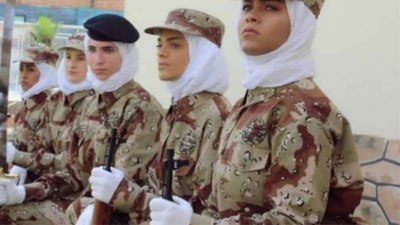Kuwaiti women are angry after the military, having allowed female soldiers in combat roles, decided they need the permission of a male guardian and banned them from carrying weapons.
Activists have decried the policy as “one step forward, two steps back” after the defence ministry also decided that women in the armed forces, unlike civilians, must wear head coverings.
The moves have sparked an online backlash in Kuwait, usually regarded as one of the most open societies in the Gulf. “I don’t know why there are these restrictions to join the army,” Ghadeer al-Khashti, a sports teacher and member of Kuwait Football Association’s women committee, told AFP.
“We have all kinds of women working in all fields, including the police force.” She said her mother had helped the resistance when Iraqi dictator Saddam Hussein in 1990 invaded Kuwait and occu-pied it for seven months before being pushed out by a US-led international coalition.
“My mum during the Iraqi invasion used to hide weapons under her abaya and transport them to members of Kuwait’s resistance, and my father en-couraged it,” said Khashti.
“I don’t understand on what basis they see women as weak.” The ministry decided in October to allow women in combat roles but then imposed the restrictions after the defence minister was ques-tioned by conservative lawmaker Hamdan al-Azmi.
Azmi, emboldened by an Islamic religious edict, or fatwa, had argued that having women in combat roles “does not fit with a woman’s nature”.
Lulwa Saleh al-Mulla, head of the Kuwaiti Women’s Cultural and Social Society, said the min-istry’s restrictions are discriminatory and unconstitu-tional and vowed legal action by the organisation.
“We have women martyrs who defended their country of their own volition,” she told AFP. “No one ordered them to do that but the love for their country.—AFP










